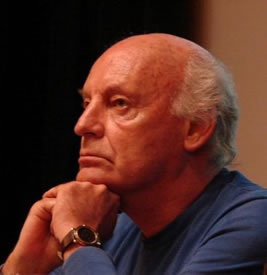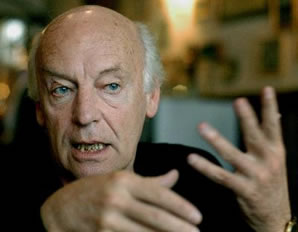De Indische schrijfster Kiran Desai werd geboren op 3 september 1971 in New Dehli.
Uit: Hullabaloo In The Guava Orchard
„That summer the heat had enveloped the whole of Shahkot in a murky yellow haze. The clutter of rooftops and washing lines that usually stretched all the way to the foothills at the horizon grew blurred and merged with the dust-filled sky.
‘Problems have been located in the cumulus that have become overly heated,’ read Mr. Chawla from the newspaper. ‘It is all a result of volcanic ash thrown up in the latest spurt of activity in Tierra del Fuego.’
And a little later he reported to whomever might be listening: ‘The problem lies in the currents off the West African coastline and the unexplained molecular movement observed in the polar ice-caps.’
And: ‘Irag attempts to steal monsoon by deliberately creating low pressure over desert provinces and deflecting winds from India.’
And even: ‘Hungarian musician offers to draw rain clouds from Europe to India via the music of his flute.’
‘Why can’t they think of serious solutions?’ asked Mr. Chawla. ‘It is too hot to fool about with Hungarian musicians.’
Shahkot boasted some of the highest temperatures in the country and here there were dozens of monsoon-inducing proposals. Mr. Chawla himself submitted a proposal to the forestry department for the cutting and growing of vegetation in elaborate patterns; the army proposed the scattering and driving of clouds by jet planes flying in a special geometric formation; the police a frog wedding to be performed by temple priests.
Vermaji of the university invented a giant fan which he hoped would attract the southern monsoon clouds by creating a wind tunnel moving north toward the Himalayas, and he petitioned the Electricity Supply Board for enough power to test it. Amateur scientists from Mr. Barnala of Tailor Gully to Miss Raina from Sainik Farms area attended trade fairs where they displayed instruments that emitted magnetic rays and loud buzzing sounds. Everyone in the town was worried. The mercury in the police station thermometer exceeded the gradations Kapoor & Sons Happy Weather Company had seen fit to establish, leaping beyond memory and imagination, and outdoing the predictions of even Mr Chawla’s mother, Ammaji, who liked to think she knew exactly what the future would bring.
It was a summer that sent the dizzy pulse of fever into the sky, in which even rules and laws that usually stood straight and purposeful grew limp, like plants exposed to the afternoon sun, and weak. The heat softened and spread the roads into sticky pools of pitch and melted the grease in the Brigadier’s mustache so that it drooped and uncurled, casting shadows on his fine, crisp presence.
Kiran Desai (New Dehli, 3 september 1971)
De Uruguayaanse schrijver, essayist en journalist Eduardo Hughes Galeano werd geboren op 3 september 1940 in Montevideo. Zie ook alle tags voor Eduardo Galeano op dit blog.
Uit: Mirrors
„MEXICANS
Tlazoltéotl, Mexico’s moon, goddess of the Huasteca night, managed to elbow her way into the macho pantheon of the Aztecs.
She was the most mothering of mothers, who protected women in labor and their midwives, and guided seeds on their voyage to becoming plants. Goddess of love and also of garbage, condemned to eat shit, she embodied fertility and lust.
Like Eve, like Pandora, Tlazoltéotl bore the guilt for men’s perdition; women born in her times lived condemned to pleasure.
And when the earth trembled, in soft vibrations or devastating earthquakes, no one doubted: “It is she.”
***
DJANGO
Born in a gypsy caravan, he spent his early years on the road in Belgium, playing the banjo for a dancing bear and a goat.
He was eighteen when his wagon caught fire and he was left for dead. He lost a leg, a hand. Goodbye road, goodbye music.
But when they were about to amputate, he regained the use of his leg. And from his lost hand he managed to save two fingers and become one of the best jazz guitarists in history.
There was a secret pact between Django Reinhardt and his guitar. If he would play her, she would lend him the fingers he was missing.“
Eduardo Galeano (Montevideo, 3 september 1940)
Zie voor de twee bovenstaande schrijvers ook ook mijn blog van 3 september 2008.
De Amerikaanse schrijfster en literatuurwetenschapster Alison Lurie werd geboren op 3 september 1926 in Chicago, Illinois. Zie ook mijn blog van 3 september 2007 en ook mijn blog van 3 september 2008.
Uit: Familiar Spirits
„When James Merrill and I first met we didn’t take to each other. If someone had told me that day that we would be friends for forty years, I would have thought they were joking.
It was the hot summer of 1950; I and my first husband, Jonathan Bishop, were in Europe on a postponed honeymoon. We had come to Austria to stay with Lynn and Ted Hoffman, who were working at the Salzburg Seminar. An acquaintance from Harvard, Claude Fredericks, was in town, too, and they arranged for all of us to have lunch and go for a swim in a nearby lake. Both Lynn and I were fond of Claude, and hoped to find the friend he was traveling with, another young poet, equally likable.
But Jimmy Merrill was a disappointment. Compared to Claude he seemed both coolly detached and awkwardly self-conscious. He was thin and pale and shortsighted, with thick black-rimmed spectacles (later he would wear contact lenses). Though only twenty-four, he was clearly already an intellectual and an aesthete. He appeared to have read everything and, worse, to be surprised at our ignorance.
The lake turned out to be a large light-struck shiny pond, mainly surrounded by woods. Fallen tree trunks littered the steep, sandy margin, and more floated offshore. The water was a clear, dark brown, and very deep; a top layer had been warmed by the sun, but below it was icy, and choked with the rubbery yellow and green straps of water weeds.
Most of us splashed about briefly and then waded out, but Jimmy stayed longer; and in spite of his weedy appearance he turned out to be a skilled swimmer. Unlike professional athletes, who often seem to be fighting the water, attacking it with violent slapping assaults and throwing off sprays of liquid shrapnel, Jimmy hardly broke the surface as he swam. The dark wet element parted smoothly for him as it might have for some long, elegant pale fish. When he finally waded out, however, he again seemed chilly and ill at ease.
As his memoir of those years declares in its title, Jimmy was A Different Person then, in both senses of the phrase. He was different from most other persons, and he was different from the person he would become. Most of us change as we age, but Jimmy changed more than most. He not only became more confident and better-looking—eventually elegantly handsome—he also became kinder, more generous, and more sympathetic. He never quite became an ordinary person, but his instinctive scorn of fools, once only half-concealed by good manners, relaxed and gave way to a detached, affectionate amusement, such as a highly civilized visitor from another planet might feel. Perhaps that is why he eventually seemed so much at home with the otherworldly beings he and David Jackson contacted through the Ouija board.”

Alison Lurie (Chigaco, 3 september 1926)
De Russische schrijver Sergej Dovlatov werd geboren op 3 september 1941 in Ufa, in het zuiden van Rusland. Zie ook mijn blog van 3 september 2007 en ook mijn blog van 3 september 2008.
Uit: Kurz ist das Leben (Vertaald door Eric Boemer)
„Levickij öffnete die Augen und versuchte sich sofort wieder an eine Metapher zu erinnern, die er gestern vergessen hatte … »Des Vollmonds Pfefferminztablette …«? »Die krumme Banane des Halbmonds …«? Irgendwas in dieser Art, wenn auch bedeutender im Geist.
Die Metaphern kamen nachts, wenn er schon im Bett lag. Der Maestro bummelte mit den Notizen. Früher konnte er sie bis zum Morgen im Gedächtnis halten. Heute war es zur Regel geworden, dass er sie, nicht ohne ein Gefühl der Befriedigung, wieder vergaß. Die vergebene Chance eines kleinen sprachlichen Abenteuers.
Levickij richtete seinen Blick auf ein weißes, der Farbe einer Ambulanz nachgestaltetes Tischchen. Er bemerkte die gewaltige, mit dorischen Figurationen geschmückte Torte. Er begann, die dünnen, gewundenen Kerzen zu zählen.
Mein Gott, dachte Levickij, noch ein Geburtstag.
Diese Phrase war es wert, sie für die Reporter aufzusparen:
»Mein Gott! Noch ein Geburtstag! Was für eine angenehme Überraschung
– siebzig Jahre!«
Er stellte sich die Schlagzeilen vor:
»Russischer Schriftsteller feiert seinen Siebzigsten in der Fremde«. »Die Bücher des Jubilars erscheinen überall, mit Ausnahme von Moskau«. Und schließlich: »O mein Gott, ein weiterer Geburtstag!« …
Levickij duschte, zog sich an. Griff nach der Post. Die Gattin war offensichtlich in Sachen Geschenke unterwegs. Gerlinda – ein Geschöpf zwischen Verwandter und Dienstbotin – umarmte ihn. Der Maestro unterbrach sie mit den Worten:
»Du bist im Testament berücksichtigt.«
Das war ein alter Scherz zwischen ihnen.
Sie fragte:
»Tee oder Kaffee?«
»Kaffee bitte.«
»Welchen möchten sie?«
»Den braunen, wahrscheinlich.«
Dann hörte er:
»Sie werden von einer Dame erwartet.«
Schnell fragte er:
»Aber nicht die mit dem Zopf?«
»Sie hat irgendeine Rarität mitgebracht. Ich glaube – ein Buch. Sie sagte – eine Inkunabel.«
Levickij zitierte lächelnd:
»De ses mains tombe le livre,
Dans leguel elle n’avait rien lu.
(Aus ihrer Hand fiel ein ungelesenes Buch …)«
Regina Gasparjan saß seit mehr als einer Stunde in der Halle. Zum Ausgleich reichte man ihr Kaffee mit Brötchen. Nichtsdestoweniger war das ziemlich erniedrigend. Man hätte sie in den Salon bitten können. Ihre Ehrfurcht mischte sich mit beleidigtem Unbehagen.“
Sergej Dovlatov (3 september 1941 – 24 augustus 1990)
Onafhankelijk van geboortedata:
De Duitse dichter, schrijver en striptekenaar Lino Wirag werd geboren in 1983 in Pforzheim. Wirag studeerde literatuurwetenschappen en kunstgeschiedenis in Freiburg, creatief schrijven en cultuurjournalistiek in Hildesheim en kunst in het Finse Uusikaarlepyy. Hij publiceerde in tijdschrijften, magazines en kranten. In 2005 ontwikkelde hij het format „Live.Poetry“. Bij deze combinatie van Poetry Slam en theatersport laten schrijvers in interactie met het publiek teksten ontstaan.
Vereinstreffen
Heute traf sich in der Kneipe
Unser Murmeltier-Verein
Durch die schmutzbedeckte Scheibe
Sah man Murmeltiere schrein
»Gebt das Land den Murmeltieren!«
»Murmeltiere einig Reich!«
»Nie mehr sollen Murmeln frieren,
Macht den Murmeln, und das gleich!«
Lange konnte man sie hören,
Wie sie Murmelverse schrien
Und dabei den Staat der gröbsten
Murmelrechtsverletzung ziehn
Gegen fünf Uhr in der Frühe
Legte dann ihr Eifer sich.
Bis das ganze Murmelschreien
Nur noch einem Murmeln glich.
Lino Wirag (Pforzheim, 1983)

















